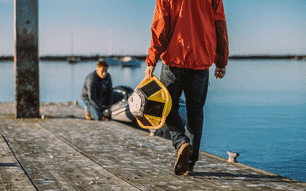The campaign was developed on board the ship Freuetó which departs from the port of L’Estartit, and runs in the Montgrí, Medes Islands and Baix Ter Natural Park.
Experts Bernat Hereu, Cristina Linares, Pol Capdevila and Eneko Aspillaga participated in this first action to detect and remove lost fishing gear.
The campaign aims at minimising the impact that fishing equipment produces on the seabed and marine ecosystems. It will also increase natural park users’ awareness of the fragility of the seabed and the efforts that must be made in order to preserve and recover natural heritage.
Ghost nets that continue catching fish
Most gear used in leisure fishing is not spread out by power-driven boats and is not swept along the seabed.
“However when fishing gear (hooks, threads, weights, long lines, trammel, etc.) get lost or trapped on the seabed, they may produce severe impacts on marine ecosystems,” said Bernat Hereu, professor in the Department of Ecology at the University of Barcalona and coordinator of the scientific campaign.
Lost fishing gear can become “ghost nets” that continue catching fish for many months without any type of profit for fisheries.
According to the experts, they are responsible for a high percentage of incidental bycatch of commercial and non-commercial species all over the world. Moreover, fish caught in these 'ghost nets' can be a death trap for marine birds like cormorants and shags.
A threat to seabed biodiversity
Lost fishing nets, which can be hundreds of metres long, are swept along the seabed by the movement of water masses, so they can become fouled with sessile organisms that inhabit the marine seabed.
“Communities inhabiting the seabed, particularly coralline, are composed by a large amount of slow growing organisms which present a fragile structure, like calcareous algae, gorgonians, bryozoans, arborescent algae, etc. They are particularly sensitive to any physical alteration and they need so much time to recover,” emphasized Bernat Hereu.
It is important to highlight that, as times goes by, plastic used to manufacture fishing gear degrades and enters the marine food chain, which creates a new threat to the conservation of many species that ingest them accidentally.
Safer leisure activities on the coast
Fishing nets also endanger the safety in areas like the Catalan coast where there is so much leisure and tourism activity related to the seabed: particularly, they involve risks for navigation (nets become fouled in propellers, for example), swimmers and scuba divers.
Besides its environmental impact, lost fishing gear produces a bad image that discourages tourists from enjoying nature.
The protocol to remove lost nets in the Montgrí, Medes Islands and Baix Ter Natural Park is part of a project of the research group MedRecover; it designs a series of measures to prevent and mitigate fishing gear remains.
The project, which can be extended to other parts of the Catalan coast, includes campaigns for educating fishers; campaigns for detecting nets with the collaboration of fishers, swimmers, scuba divers and sailors, and the removal of nets with minimum environmental impact.


